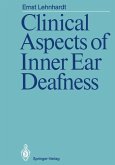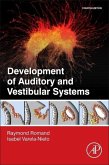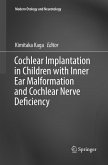This book approaches inner ear diseases from a perspective that is as multifaceted as the diseases themselves. Common among these disorders are sudden deafness, Ménière's disease, and perilymphatic fistula. With an awareness of the generally insufficient understanding of the causes and etiologies of these and other inner ear diseases, the author helps to fill those gaps in knowledge.
Several factors have impeded a clearer understanding of inner ear diseases, chiefly the small size of the organ and its location in the hard temporal bone and, consequently, the inadequate resolution of CT and MRI images for pathophysiological analysis. This book provides morphological information about the inner ear, elucidating its fluids and blood vessels to help familiarize the reader with the complicated inner ear structures. Important information about how the inner ear responds to various stimuli is also given for a better understanding of the characteristics of the organ. Included are chapters describing specific diseases and animal models of the diseases. Examples and illustrations are presented for surgical applications. For instance, patients with intractable vertigo of inner-ear origin require surgical treatment and the application of a laser to the vestibular labyrinth, described in detail.
With its generous use of color photographs, this book is an excellent reference text for all doctors and trainees in the field of otolaryngology.
Several factors have impeded a clearer understanding of inner ear diseases, chiefly the small size of the organ and its location in the hard temporal bone and, consequently, the inadequate resolution of CT and MRI images for pathophysiological analysis. This book provides morphological information about the inner ear, elucidating its fluids and blood vessels to help familiarize the reader with the complicated inner ear structures. Important information about how the inner ear responds to various stimuli is also given for a better understanding of the characteristics of the organ. Included are chapters describing specific diseases and animal models of the diseases. Examples and illustrations are presented for surgical applications. For instance, patients with intractable vertigo of inner-ear origin require surgical treatment and the application of a laser to the vestibular labyrinth, described in detail.
With its generous use of color photographs, this book is an excellent reference text for all doctors and trainees in the field of otolaryngology.
From the reviews:
"This book describes the pathophysiology of the inner ear in detail, using many color photographs and illustrations. ... The audience includes otolaryngologists, neurotologists, and audiologists. ... It is worthwhile reading ... ." (Akihiro J. Matsuoka, Doody's Book Reviews, March, 2014)
"This book describes the pathophysiology of the inner ear in detail, using many color photographs and illustrations. ... The audience includes otolaryngologists, neurotologists, and audiologists. ... It is worthwhile reading ... ." (Akihiro J. Matsuoka, Doody's Book Reviews, March, 2014)








